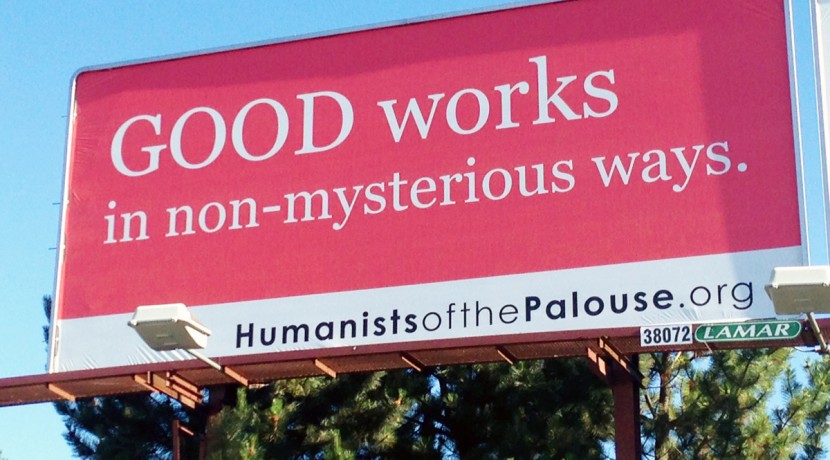Humanist Billboards Work, in Non-Mysterious Ways
I was raised as a fundamentalist Christian. When I left those beliefs behind I looked for substitute religions, each time choosing one less dogmatic and more freethinking than the last. It never occurred to me that “none” was an option—that there might be a community of others like me, who believe that they could still be good people without a god.

Humanists of the Palouse's latest billboard campaign in the Moscow, ID, and Pullman, WA areas.
Several years ago, while driving through my small town of Moscow, Idaho, I passed a billboard on the side of the road. It read, "Ethical values are derived from human need and interest as tested by experience. Humanism Works!" Underneath was listed the website, HumanistsofthePalouse.org. This billboard was my first introduction to humanism, and the moment when I began to understand that a belief system based on humanity and reason rather than superstition was a possibility.
Fast-forward to today. I'm now the American Humanist Association’s program coordinator for the Palouse region, which includes Moscow, Idaho, and Pullman, Washington. I’m also a member of the Humanists of the Palouse, the local AHA chapter. We work to bring awareness of humanist principles to a very conservative part of the northwest United States. Our group has grown rapidly in the last few years, due in part to billboard advertising and local events such as Darwin on the Palouse and Wonder Works Day Camp.
This week the Humanists of the Palouse put up five new billboards as part of an on-going campaign. They are eye-catching and simply state: "GOOD works in non-mysterious ways." The original phrase, "God works in mysterious ways," is familiar to anyone with even a tiny bit of exposure to Christianity. It’s often used as an attempt to explain the age-old conflict of why bad things happen to good people, why fervent prayers go unanswered, and to dismiss any doubts that believers might have. Unfortunately, to many this phrase is of little comfort and is merely a reminder that religion doesn’t work. However, what does work is good people doing good deeds—plain and simple. It’s not mysterious, supernatural, or complicated, and it makes the world a better place.
We’ve had an overwhelmingly positive response to these newest billboards—we’ve seen a significant increase in membership and in activity on our website and Facebook page—and we’re excited about the impact we’re having. We’ve received a lot of positive feedback in comments and emails from people who say that the message really resonates with them. From an article on the Friendly Atheist blog, to front page headlines in the Moscow-Pullman Daily News, to an interview on our local TV station (KLEW), we’re reaching people on multiple levels.
Some have asked why we do these billboards, or do outreach at all. While the “nones” are a very fast-growing segment of the U.S. population, nonbelievers still face a lot of discrimination. These billboards are important because they bring awareness of nontheism and help to disprove negative stereotypes about humanists, nonbelievers, freethinkers, skeptics, atheists, and agnostics. In a small town, many people who’ve left religion behind may feel isolated, unaware that there are like-minded individuals out there with whom they can find support, friendship, and community.
Our hope with this campaign is that someone, maybe a student who has just arrived in town for their first semester of college, or perhaps a longtime resident, will be inspired by a billboard. They might realize, as I did, that there is freedom from guilt, dogma, and superstition, and that humanism provides a rational and fulfilling life philosophy that, without mystery, promote good works simply because doing good works.Tags: Billboards, Humanists of the Palouse
